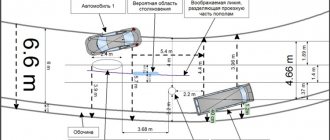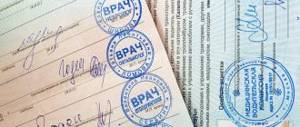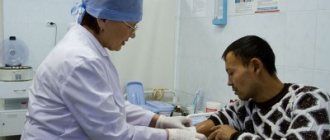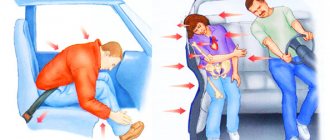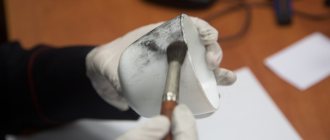The developed car loan system allows more and more people to purchase personal cars. Traffic on the roads is becoming increasingly intense, and road accidents with varying degrees of damage have become common. And the accident does not always end only with broken headlights; in some cases, serious harm is caused to people’s health, and sometimes the accident results in death for the participants.
Drivers who violate traffic rules are not always at fault. Sometimes difficult traffic situations are caused by pedestrians or weather conditions. Such cases are always dealt with with the involvement of law enforcement agencies. And forensic medical experts are the most actively involved in this process.
The concept of conducting a forensic medical examination
This concept includes a list of highly qualified actions performed that will help determine the severity of harm caused to participants in an accident. It is usually carried out to determine the circumstances of a person’s death. Only professionals with certain knowledge and experience in such matters are authorized to perform this procedure. After completing the procedure, a test result certified by specialists is issued, which can be used as an argument when hearing the case in court.
If a third party receives moderate damage, the party found guilty will bear administrative liability. The presence of serious injuries that result in disability or death of a person may result in criminal prosecution.
Types of forensic medical examination
Professionals divide forensic examination into several aspects, which include:
- Test object,
- Type and complexity of the procedure.
According to the first criterion, this procedure can be performed in relation to a corpse or a living object.
According to the second, forensic medical examination is divided into the following types:
- Complex,
- Additional,
- Repeated,
- Commission.
Such actions can be carried out by government agencies or independent specialists, but in the latter case the organization must have permission to carry out this type of activity. A complex type of such examination is carried out by several specialists. Professionals from various fields in the medical field are involved in this procedure.
IMPORTANT !!! If, after completing it, controversial issues remain, a re-examination is scheduled. During a commission examination, members of the commission are involved in conducting the study, for which experienced specialists in various fields of medical practice are selected. Each physician must sign the final report. When the opinion of one of the invited specialists does not coincide with the opinion of the other experts, he indicates his explanation in the conclusion.
A medical examination can be performed at the request of one or both parties. In fact, if an ambulance goes to the scene of an accident, a medical examination will be ordered. Many drivers are interested in questions about whether a forensic examination is needed after an accident? How is it carried out? Deadlines? What is it for? All these questions will be answered below.
How should a medical examination be carried out?
To conduct a medical examination, a corresponding resolution from the authorized body is required. It can be an inquiry officer, an investigator or a judge, as well as other authorities.
The decision to conduct this examination must contain:
- The name of the case according to which the medical examination is being carried out,
- The official party initiating the medical examination
- The name of the organization that will perform the forensic medical examination,
- Information about the testing object,
- Sample information.
All information received will be carefully processed, after which a written conclusion on the test results will be issued.
This document states:
- Full names of the experts who carried out the research work,
- Information about the object of examination,
- List of studies carried out,
- Answers to pressing questions posed by an authorized person.
If there are inaccuracies or controversial issues based on the results of the examination, a repeat examination is ordered. If it is necessary to clarify certain nuances, the expert may be summoned to court as a witness. For drawing up a false or grossly inaccurate conclusion, an expert may be subject to criminal prosecution.
Violation of substantive rules of law governing the procedure for conducting forensic medical examinations
The legislation allows you to appeal a court decision if there is a significant violation of substantive law that arose during the conduct of a forensic medical examination and influenced the adoption of the court decision.
Violations of substantive law during forensic medical examinations are not as common as procedural violations or expert errors. However, as an example, we can cite a situation where, during the examination, medical documents were improperly examined, as a result of which the severity of the harm to health was incorrectly determined, which influenced the qualification of the unlawful act (for example, a fracture of the ethmoid bone of the base of the skull, which was not accompanied by the development of edema brain, was mistakenly classified as moderate harm, when in fact such injuries are serious harm to health - regardless of the presence of complications).
There are also possible cases when, in violation of the legal requirements for the professional and qualification requirements of a forensic expert in Art. 13 of the Federal Law “On State Forensic Activities in the Russian Federation”, a person who does not meet the specified requirements carries out a forensic medical examination.
As another example, we can cite the Determination of the Judicial Collegium for Civil Cases of the Supreme Court of the Russian Federation dated March 11, 2019 No. 18-КГ18-253. From the case materials it is known that Prokopchik Y.S. (hereinafter referred to as the applicant) filed a claim against the State Budgetary Institution “Clinical Anti-TB Dispensary” with a claim for compensation for harm caused to health, recovery of compensation for moral damage and a fine. At the court hearing, it was established that the applicant was given an incorrect diagnosis and underwent laparoscopic surgery, as a result of which she developed a disease that made it impossible for her to give birth to children naturally.
By the decision of the court of first instance and the Appeal Ruling of the Judicial Collegium for Civil Cases, the applicant’s claims were denied. When considering the case by the Judicial Collegium for Civil Cases of the Supreme Court of the Russian Federation, the court came to the conclusion that when conducting a comprehensive forensic medical and psychological examination, the norms of substantive law were violated, namely, Article 18 of the Federal Law “On State Forensic Expert Activities in the Russian Federation” " This norm establishes a restriction in organizing and conducting a forensic examination regarding the prohibition of the participation of a doctor who provided medical assistance to a person in the conduct of a forensic medical examination in relation to this person.
The court of first instance based the court decision on a forensic medical report, which was signed, among other things, by the doctor who provided medical care to the applicant.
In addition to these violations, the court of first instance placed the burden of proving harm on the applicant, although in disputes arising from harm to life and health, a presumption of guilt of the harm-doer is established, and the victim must prove only the fact of the existence of such harm.
Taking into account the above circumstances, the Judicial Collegium for Civil Cases of the Supreme Court of the Russian Federation decided to cancel the decision of the court of first instance and the appeal ruling of the Judicial Collegium for Civil Cases of the Krasnodar Regional Court and send the case for a new trial to the court of first instance.
Deadlines provided for by law
Due to the subtlety of the required work and the variety of methods for conducting the examination, the legislation does not establish deadlines for carrying out this procedure. Tests can take quite a long time, so parties should be patient and wait for the results.
Sometimes the tests take several months. The timing directly depends on the complexity of the task assigned to the expert. In the event of a death of a third party, only a couple of days are allocated to conduct the study. If the examination is carried out in a private institution, then the deadlines for execution will be specified in the agreement between the customer and the contractor. Failure to comply with the terms of the contract will be grounds for initiating legal proceedings for violations specified in the contract.
IMPORTANT !!! When a pedestrian is injured as a result of an accident, a medical examination is mandatory. Usually, a criminal case is initiated, and the examination procedure itself is initiated by the inquiry officer or investigator. If the pedestrian suffered minor injuries and drove home after the accident, he may be called to undergo a forensic examination if necessary. There are cases when a pedestrian initially feels great, does not feel pain and insists on the need to leave for his business.
In this case, he may be released by law enforcement agencies. If a pedestrian feels unwell during the day or at night, he can go to a medical facility for medical assistance. This fact must be recorded, then the investigator will order a forensic medical examination, as a result of which the injured party can claim compensation for treatment losses.
To conduct a forensic medical examination, it is necessary to present to the expert all documents received at the medical institutions where the injured party received assistance. If all necessary documents are not available, the examination will not be carried out. It is important to note that the conclusion issued by the experts cannot be appealed, but in some cases it is possible to prescribe repeated or additional testing.
Violation of the forensic medical examination procedure
Expert errors of a procedural nature also occur quite often in judicial practice. The main ones are:
- The expert goes beyond the limits of his competence;
- Expression of an expert’s initiative in forms not provided for by law;
- Justification of expert conclusions based on the case materials, and not on the results of the research;
- Failure to comply with procedural requirements for the conclusion of a forensic expert;
- Independent collection of materials and objects of examination or acceptance of them from unauthorized persons.
We note that despite the fact that the law prohibits the independent collection of examination materials by forensic experts, it is not considered a violation of the law for an expert to request medical data from medical institutions.
For example, in the Appeal Resolution of the Tula Regional Court No. 22-1563 dated August 18, 2017, the court indicated that the study of medical documents seized from medical institutions without a court decision cannot lead to the recognition of the conclusion of a forensic medical examination as inadmissible evidence.
Part 3 of Article 183 of the Code of Criminal Procedure of the Russian Federation establishes that the seizure of documents and objects containing state or other secrets established by law is carried out on the basis of a court decision. In accordance with Part 1 of Art. 13 of the Federal Law “On the Fundamentals of Protecting the Health of Citizens in the Russian Federation”, information about the fact that a citizen sought medical help, his state of health and diagnosis, and other information obtained during his medical examination and treatment constitute a medical secret. In clause 3, part 4, art. 13 of the law in question also states that at the request of the bodies of inquiry, investigation, court in connection with an investigation or trial, as well as at the request of the prosecutor's office or the penal system, it is permitted to provide information constituting medical confidentiality without the consent of the citizen.
Thus, the courts are of the opinion that the circumstances of the seizure of medical documents from medical institutions cannot influence the reliability of the information contained in it and the legality of the expert’s conclusions, and also do not violate the rights of citizens in the field of protecting information constituting medical confidentiality.
Violation of the norms of procedural law during a forensic medical examination of a case can also serve as grounds for appealing a court decision.
Articles 16 and 18 of the Code of Civil Procedure of the Russian Federation stipulate that an expert cannot participate in court proceedings if the following circumstances exist:
- during the previous consideration of the case, he participated in it as a prosecutor, assistant judge, court secretary, representative, expert, specialist or translator;
- was a judicial conciliator in this case;
- is a relative of any of the persons participating in the case or their representative;
- is personally, directly or indirectly interested in the outcome of the case or there are other circumstances that raise doubts about his impartiality;
- was or is in official or other dependence on any of the persons participating in the case.
The Code of Criminal Procedure, in Article 70, contains conditions that indicate the impossibility of an expert’s participation in a specific trial, namely if the forensic expert:
- is a victim, civil plaintiff or defendant, witness in this criminal case;
- participated in the trial as a juror, expert, specialist, translator, witness, assistant judge or court secretary, defense attorney, legal representative of the suspect/accused, representative of the victim, civil plaintiff or defendant;
- is a relative of one of the participants in the criminal case;
- was or is in official or other dependence on a party to the case or a representative;
- his incompetence was revealed.
If one or more of the above conditions are present during a forensic medical examination, either party has the right to petition to declare the examination illegal and to exclude it from evidence in a criminal or civil case.
Often in practice, situations arise when the court violates several rules of procedural law at once, allowing the question of recognizing a forensic medical examination to be illegal and excluding it from evidence in the case.
For example, in the decision of the Volgograd Regional Court No. 07p-307 of September 19, 2019, in a case of an administrative violation, it was stated that the decision of the trial judge to order a forensic medical examination, as it turned out, was appointed as part of a procedural check based on a person’s statement about causing bodily harm. It was clear from the text of the resolution that the expert was not explained his rights and obligations. In addition, the expert was not warned about administrative liability for giving knowingly false testimony, but was warned about criminal liability, which also violated the rules of procedural law.
In addition, from the case materials it was clear that on the basis of the report of the official who carried out the inspection, upon completion of the inspection, a decision was made to initiate a case for an administrative offense. Consequently, all procedural actions to carry out a forensic medical examination were carried out before the initiation of a case of an administrative offense. The person brought to administrative responsibility and the victim were not familiar with the results of the forensic medical examination, which also violated their rights and legitimate interests. Consequently, the conclusion of the forensic medical examination could not be used as evidence in the case and could not be used as the basis for the accusation, since it does not meet the requirements of the Code of Administrative Offenses of the Russian Federation.
As a result, the decision of the first instance court was canceled and sent for a new trial to the same court.
At the same time, I would like to note that, for example, the Trans-Baikal Regional Court in Appeal Resolution No. 22-13/2/2016 dated May 20, 2016, came to the conclusion that the mere failure to familiarize the parties to the case with the decision on the appointment forensic medical examination does not entail the recognition of the expert opinion as inadmissible evidence.
Or, for example, in the Appeal Resolution of the Primorsky Regional Court No. 22-3961/2019. in a criminal case, the court motivated its refusal to recognize the forensic medical report as inadmissible evidence by the fact that during the trial the party had the opportunity to petition for the appointment of an additional or repeated forensic medical examination with the posing of the necessary questions to the expert.
Undoubtedly, such court decisions violate the procedural rights of citizens and are due to the fact that the Code of Criminal Procedure of the Russian Federation does not establish an exact period for familiarizing the accused with the decision to order an examination, but only assigns this right to him in Part 1 of Art. 198 Code of Criminal Procedure of the Russian Federation.
Of course, the Plenum of the Supreme Court of the Russian Federation in Resolution No. 28 of December 21, 2010, in paragraph 9, explained that “the suspect, the accused and their defense attorneys, as well as the victim, must be familiar with the decision to order a forensic medical examination before it is carried out. If a person is recognized as a suspect, accused or victim after a forensic examination has been ordered, he must be familiarized with this decision at the same time as he is recognized as such, and a corresponding protocol is drawn up.” However, as stated above, failure to comply with this requirement does not entail the recognition of such evidence as inadmissible.
What aspects can be discovered during such an examination?
After conducting all the necessary tests, the expert will be able to answer the following questions:
- Determination of the impact force that caused certain damage,
- Presence, location on the body and duration of existing injuries,
- Body position during an accident,
- The presence of alcohol, drugs, medications or psychotropic substances in the blood of all participants in the accident,
- The procedure for causing damage, because the victim can cause damage to himself in order to receive a larger amount of compensation,
- Determining the vehicle that may cause injury to the victim,
- In the event of a fatality for one of the parties to the accident, the expert will be able to determine the impact that resulted in death.
Examination of the deceased
If there are deaths as a result of the accident, then the examination of the corpse has its own goals and questions that need to be answered:
- what kind of injury was the cause of death and the time of its occurrence;
- the presence of injuries on the body, their nature and method of formation;
- the impact of injuries on human death;
- presence (absence) of intoxication of various etiologies.
Due to the fact that the death of a person as a result of a road accident is a serious consequence that can form the basis of criminal punishment for the perpetrator, the entire process of conducting a corpse examination is clearly regulated by regulations and their implementation is the key to recognition of the result of the work of an expert (or group of experts).
Another difference from the examination of a living person is that the object is considered not only the corpse itself, but also his clothing in the form in which he had an accident. Inspection of clothing is carried out in the following sequence: first the pockets and front part, then the back part and finally the inside of the clothing (wrong side) is inspected. All actions are accompanied by logging indicating all details important for the study.
The period for conducting the examination should be as short as possible, usually 1-2 days from the moment of the accident or discovery of the corpse.
The examination of the body begins with recording the condition of the skin, whether there are hematomas, abrasions, cuts or ruptures on it, whether cadaveric spots have already appeared (if some time has passed since the accident). A conclusion is drawn about when a person received certain skin injuries and whether this was a consequence of an accident or not. Foreign objects are removed from the body (shards of glass, fragments of a vehicle body), they are added to the case file and handed over to the investigator. The hair on the head and the oral cavity are also subject to scrupulous examination.
At the final stage, an autopsy takes place to determine the exact cause of death during an audit of the internal organs and their condition.
The main information concerns the existence of a cause-and-effect relationship between the death of the victim and the actions of the person responsible for the accident.
When is a forensic examination performed?
A medical examination is carried out upon completion of treatment of the victim. This will allow you to immediately receive a complete package of documents confirming the real condition of the injured person. The expert will be able to accurately assess the extent of damage, which will be reflected in the examination report. In addition, there are some situations that make a medical examination mandatory.
These include:
- A situation where it is necessary to find out the cause of death of the victim,
- Circumstances forcing the determination of the extent of damage,
- Moments when information about the age of the participants in the incident is important for the court,
- Aspects that suggest the inadequacy or insanity of the person responsible for the accident.
What is forbidden to do during the examination?
To find out the circumstances of the accident, it is necessary to conduct a forensic examination. During its implementation, it is prohibited to use methods that could destroy evidence or aggravate the victim’s condition.
Among these methods it is worth noting:
- Deception or exploitation of the victim's ignorance,
- Medicines or diagnostic methods that have not been certified or are in preparation,
- Threats against the victim,
- Innovative operating procedures that have not undergone the necessary testing.
Cost of forensic examination
Most road accident participants are interested in the question of whether a forensic medical examination should be paid or free. This procedure is carried out in different ways. The cost of the examination depends on the purpose of obtaining data. If the request is sent by official bodies, then the amount of payment for the procedure may be recovered from the guilty party. Most drivers, trying to prove that they are right, contact private organizations personally.
ATTENTION !!! The cost of such an examination is quite high, which makes its return on investment doubtful. The cost of this procedure can vary from 40,000 to 60,000 rubles. Therefore, before ordering this service, you should consult with a lawyer and calculate all possible options.
If the offense is serious, then the official authorities will be forced to order a forensic examination. Otherwise, you can spend a lot of money and the results will be disappointing.
Determination of health status
One of the common reasons for ordering services is to identify your current health condition. When might such research be needed?
- During a forensic medical examination of beatings.
- In case of injury in various ways to establish harm.
- It is necessary to challenge the conclusion of the commissions that consider issues of assignment of disability.
- The data from the primary study appears to be unreliable.
The degree of harm to health is one of the important parameters during legal proceedings. The qualification of the crime and possible punishment depend on it. Therefore, it is so important to set this parameter correctly.
The cost of an independent medical examination starts from 13,000 rubles
Duration from 3 days
